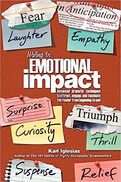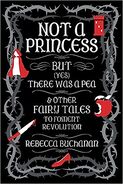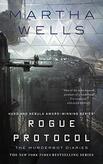| Karl Iglesias sets a high bar in Writing for Emotional Impact, with what he calls the “one-page test.” He asks “can we open [your book] at any page and be instantly gripped by the words on the page? Every page should be so interesting that a reader can’t put [it] down.” Another technique he suggests is articulating the story’s core concept and in a single sentence (often called a logline) to help focus the work. From Sea God’s Lover, my work in progress: A dedicated healer-priest defies temple protocols to save her sister and reawaken the gods. |
His five key questions help build emotionally compelling characters:
- Character traits, values, and flaws. (Sary is kind, values security and tradition, but is overly idealistic)
- Character goals & unconscious desire. (Sary’s story goal is to reawaken the gods to be a better temple healer; unconsciously, she longs to escape from temple protocols.)
- Motivation. (The gods no longer answer temple prayers, rendering Sary’s healing magic ineffective.)
- Stakes. (The city is under siege and many will die if the gods don’t respond.)
- Character change or arc. (Sary transforms from an idealistic temple healer into a powerful sorcerer)
Story structure should follow a clear cause and effect progression. This stimulus and response is how we make sense of our own lives, thus it helps the reader engage emotionally with the story.
“Every story, every scene, and every beat [within the scene] is about change--a change in knowledge caused by discoveries, and change in actions caused by character decisions.”
He advises to create a trail of story questions for the reader to follow from the opening page. Curiosity keeps the reader engaged and story answers, when revealed, “provide a sense of satisfaction.” Each beat, each scene, each chapter sequence, each act has a story question: Will Sary reach the top of the tower? How will Sary incorporate the miracle she witnesses? Will Sary defy temple protocols to find her missing sister?
“Every story, every scene, and every beat [within the scene] is about change--a change in knowledge caused by discoveries, and change in actions caused by character decisions.”
He advises to create a trail of story questions for the reader to follow from the opening page. Curiosity keeps the reader engaged and story answers, when revealed, “provide a sense of satisfaction.” Each beat, each scene, each chapter sequence, each act has a story question: Will Sary reach the top of the tower? How will Sary incorporate the miracle she witnesses? Will Sary defy temple protocols to find her missing sister?
More favorite quotes:
- Great writers are in charge of the reader’s emotions at all times--from page 1 to 110; every single page.
- Always describe something through its actions, rather than tell the reader about it through adjectives and adverbs.
- …great dialogue should communicate a character’s personality, attitudes, values, and social background
- Dialogue is always a function of what a character wants or needs in a scene
- [Scene objective] Always ask yourself what a character wants to get from the other character right now.
- Every discovery should be a tiny reversal that changes the direction of the scene’s energy, and should have an emotional impact on both the character and the reader.
- A flashback should always change the present situation of the story. Otherwise it has no purpose
- …reveal whenever possible a new facet of a character in every scene. This gives the reader a smoother interaction with that character over time
- Each sentence should have some sort of emotional impact.






 RSS Feed
RSS Feed